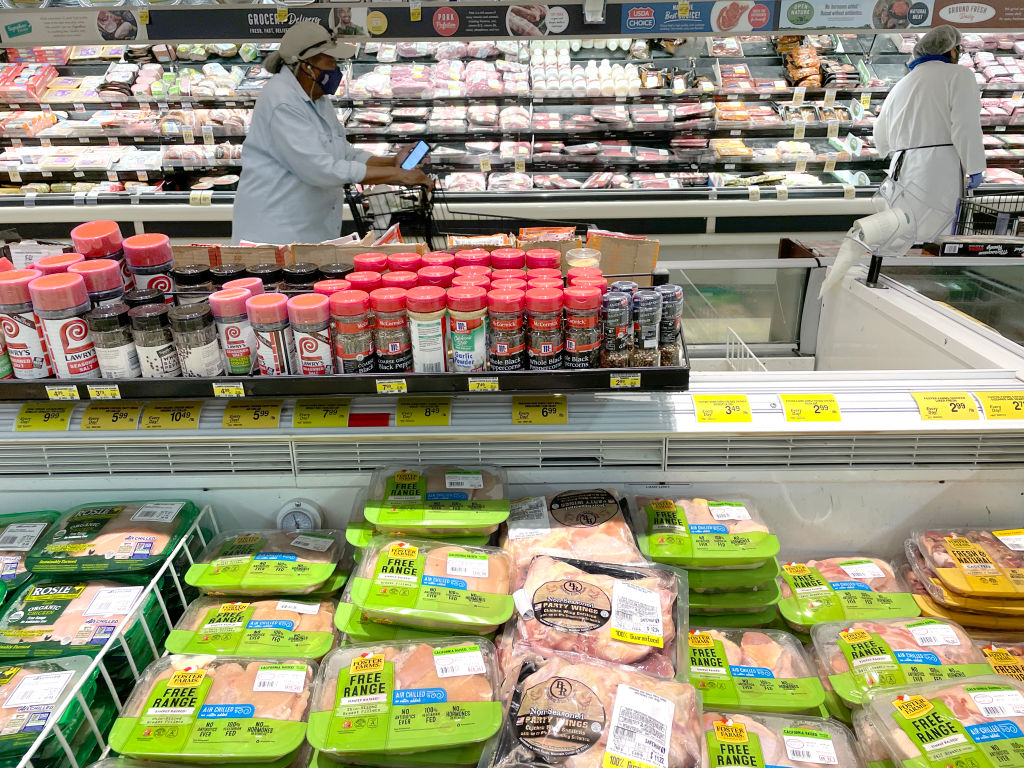Low-income Americans and food banks are struggling to make rising food prices work


A free daily email with the biggest news stories of the day – and the best features from TheWeek.com
You are now subscribed
Your newsletter sign-up was successful
As food prices continue to rise (thanks to supply chain knots, labor shortages, and inflation), lower-income Americans — who tend to spend a higher percentage of their earnings on food and housing — as well as food banks and pantries are struggling to keep up, reports The New York Times.
Indianapolis resident Robin Mueller said she used to buy ground beef for her family once or twice a week; now, she can only afford "once or twice a month," writes the Times. "You have to pick and choose," Mueller said.
A once-$13 to $14 case of peanut butter now costs $16 to $19, and green beans that used to go for $9 a case are up to $14 per, added Alexandra McMahon, director of Gleaners Food Bank of Indianapolis. "It has a big impact," explained Gleaners' COO Joseph Slater of the surge.
The Week
Escape your echo chamber. Get the facts behind the news, plus analysis from multiple perspectives.

Sign up for The Week's Free Newsletters
From our morning news briefing to a weekly Good News Newsletter, get the best of The Week delivered directly to your inbox.
From our morning news briefing to a weekly Good News Newsletter, get the best of The Week delivered directly to your inbox.
Among the items going up in price are meat, fruit, dairy products, grains and oils, per the Times. According to the Bureau of Labor Statistics, the price of meat, poultry, fish, and eggs in U.S. cities are up 15 percent since the start of 2020. It's a "slow-motion train wreck" that isn't going away any time soon, cautioned Michael Swanson, chief agricultural economist at Wells Fargo.
Meanwhile, though pandemic-linked demand for some food banks and pantries has let up recently, "things are nowhere near pre-COVID conditions," notes the Times. And an increase in food cost makes those operations even harder. "There are certain items that are outside our reach because of the price," said CEO of the Oregon Food Bank Susannah Morgan.
Warned Swanson: "The scary thing is that food companies haven't passed along all of their costs yet."
A free daily email with the biggest news stories of the day – and the best features from TheWeek.com
Brigid Kennedy worked at The Week from 2021 to 2023 as a staff writer, junior editor and then story editor, with an interest in U.S. politics, the economy and the music industry.
-
 The ‘ravenous’ demand for Cornish minerals
The ‘ravenous’ demand for Cornish mineralsUnder the Radar Growing need for critical minerals to power tech has intensified ‘appetite’ for lithium, which could be a ‘huge boon’ for local economy
-
 Why are election experts taking Trump’s midterm threats seriously?
Why are election experts taking Trump’s midterm threats seriously?IN THE SPOTLIGHT As the president muses about polling place deployments and a centralized electoral system aimed at one-party control, lawmakers are taking this administration at its word
-
 ‘Restaurateurs have become millionaires’
‘Restaurateurs have become millionaires’Instant Opinion Opinion, comment and editorials of the day
-
 TikTok secures deal to remain in US
TikTok secures deal to remain in USSpeed Read ByteDance will form a US version of the popular video-sharing platform
-
 Unemployment rate ticks up amid fall job losses
Unemployment rate ticks up amid fall job lossesSpeed Read Data released by the Commerce Department indicates ‘one of the weakest American labor markets in years’
-
 US mints final penny after 232-year run
US mints final penny after 232-year runSpeed Read Production of the one-cent coin has ended
-
 Warner Bros. explores sale amid Paramount bids
Warner Bros. explores sale amid Paramount bidsSpeed Read The media giant, home to HBO and DC Studios, has received interest from multiple buying parties
-
 Gold tops $4K per ounce, signaling financial unease
Gold tops $4K per ounce, signaling financial uneaseSpeed Read Investors are worried about President Donald Trump’s trade war
-
 Electronic Arts to go private in record $55B deal
Electronic Arts to go private in record $55B dealspeed read The video game giant is behind ‘The Sims’ and ‘Madden NFL’
-
 New York court tosses Trump's $500M fraud fine
New York court tosses Trump's $500M fraud fineSpeed Read A divided appeals court threw out a hefty penalty against President Trump for fraudulently inflating his wealth
-
 Trump said to seek government stake in Intel
Trump said to seek government stake in IntelSpeed Read The president and Intel CEO Lip-Bu Tan reportedly discussed the proposal at a recent meeting
